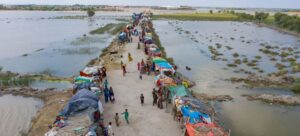Sharif had recently actively sought international help for the flood-hit country on international platforms, including at the Shanghai Cooperation Organization summit in Uzbekistan, in London, and at the 77th session of the United Nations General Assembly.
“What happened in Pakistan will not stay in Pakistan,” Pakistan prime minister Shehbaz Sharif tweeted late Wednesday evening. Sharif was not speaking about terrorism. He was speaking of the looming climate-related disasters.
Sharif warned that the looming climate change would not spare other countries after the flash floods inundated one-third of Pakistan and left millions homeless.
“What happened in Pakistan will not stay in Pakistan,” his tweet read, as he reiterated his call for urgent action a day after the UN issued a revised flash appeal of US$ 816 million as relief assistance for the flood-stricken people of the country.

A month ago, an initial US$ 160 million flash appeal was made to address immediate needs based on estimates. However, the results of the recent needs assessments, that led to the up-scaling of the flash appeal to $816 million, revealed that much more was needed to save those struggling to survive the aftermath of the floods.
Through his tweet, Sharif highlighted that more than 1,600 Pakistanis–including 400 children had lost their lives due to massive floods besides thousands of kilometres of road infrastructure and bridges washed away.
“Entire villages have been swallowed up by raging waters. Nature has been truly unforgiving,” he said.
Shehbaz Sharif had recently actively sought international help for the flood-hit country on international platforms, including at the Shanghai Cooperation Organization summit in Uzbekistan, in London, and at the 77th session of the United Nations General Assembly.
In his meetings with over 50 world leaders on the eves of SCO and UNGA last month, the prime minister called for climate justice and appealed to the world to share the burden of the climate crisis. He also highlighted that Pakistan was responsible for less than one per cent of the world’s planet-warming gases and yet, it was the eighth most vulnerable nation to the climate crisis.

During his participation at both the important global and regional forums, Sharif has interacted with foreign media to relay his message about the importance of an emergency action plan against climate change and seek funds for combatting the humanitarian emergency his country faces.

